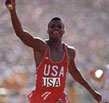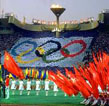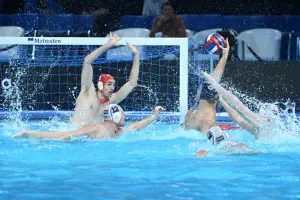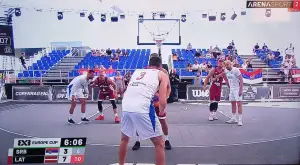Q:
A:
Olympics for Beginners
4 March 2004
From the History, Heroes of the Games, Shadows over Olympic movement, Olympic Trivia ...
FROM HISTORY
Baron Pierre de Coubertin, French educator, was primarily responsible for the revival of the Olympic Games in 1896, after nearly 1,500 years of abeyance. He was a founding member of the International Olympic Committee (IOC) and served as its president from 1896 to 1925.
The inaugural games of the modern Olympics were attended by at least 280 participants, all male, representing 13 nations. The athletes competed in 43 events covering athletics, cycling, swimming, gymnastics, weight lifting, wrestling, fencing, shooting, and tennis.
The 1896 Olympics featured the first marathon. The race followed the legendary route of Pheidippides, a trained runner who was believed to have been sent from the town of Marathon to Athens to announce the defeat of an invading army in 490 BC. The race became the highlight of the Games and was won by Spyridon Louis, a Greek whose victory earned him the lasting admiration of his nation.
The inaugural games of the modern Olympics were attended by at least 280 participants, all male, representing 13 nations. The athletes competed in 43 events covering athletics, cycling, swimming, gymnastics, weight lifting, wrestling, fencing, shooting, and tennis.
The 1896 Olympics featured the first marathon. The race followed the legendary route of Pheidippides, a trained runner who was believed to have been sent from the town of Marathon to Athens to announce the defeat of an invading army in 490 BC. The race became the highlight of the Games and was won by Spyridon Louis, a Greek whose victory earned him the lasting admiration of his nation.
The Olympic flag was presented by Coubertin in 1914. It has a white background, and in the centre there are five interlaced rings - blue, yellow, black, green, and red. These rings represent the "five parts of the world" joined together in the Olympic movement. The Olympic flag was introduced at the Antwerpen Games, 1920.
At the Congress of Paris in 1894, the control and development of the modern Olympic Games was entrusted to the International Olympic Committee. It is responsible for maintaining the regular celebration of the Olympic Games, seeing that the Games are carried out in the spirit that inspired their revival, and promoting the development of amateur sport throughout the world.
The IOC elects its president for a period of eight years, at the end of which he is eligible for reelection for further periods of four years each. Jacques Rogge of Belgium was elected in 2001. Previous presidents were Demetrius Vikelas (1894-96, Greece), Pierre, baron de Coubertin (1896-1925, France), Henri, comte de Baillet-Latour (1925-42, Belgium), J. Sigfrid Edstrom (1946-52, Sweden), Avery Brundage(1952-72, United States), Lord Killanin (1972-80, Ireland) and Juan António Samaranch (1980-2001, Spain).
At the Congress of Paris in 1894, the control and development of the modern Olympic Games was entrusted to the International Olympic Committee. It is responsible for maintaining the regular celebration of the Olympic Games, seeing that the Games are carried out in the spirit that inspired their revival, and promoting the development of amateur sport throughout the world.
The IOC elects its president for a period of eight years, at the end of which he is eligible for reelection for further periods of four years each. Jacques Rogge of Belgium was elected in 2001. Previous presidents were Demetrius Vikelas (1894-96, Greece), Pierre, baron de Coubertin (1896-1925, France), Henri, comte de Baillet-Latour (1925-42, Belgium), J. Sigfrid Edstrom (1946-52, Sweden), Avery Brundage(1952-72, United States), Lord Killanin (1972-80, Ireland) and Juan António Samaranch (1980-2001, Spain).
HEROES OF THE GAMES
American swimmer Michael Fred Phelps is the most decorated Olympian of all time, with a total of 28 medals in four Olympiads. Phelps also holds the all-time records for Olympic gold medals - 23.
Larisa Latynina, Soviet gymnast, was the first woman athlete to win nine Olympic gold medals.
Larisa Latynina, Soviet gymnast, was the first woman athlete to win nine Olympic gold medals.
The 1936 Olympics in Berlin were held in a tense, politically charged atmosphere. The Nazi Party had risen to power in 1933, two years after Berlin was awarded the Games, and its racist policies led to international debate about a boycott of the Games. An alternative competition, to be called the "People's Olympics," was scheduled for Barcelona, Spain, but this plan was abandoned with the outbreak of the Spanish Civil War.
Adolf Hitler and the Nazi Party viewed the Olympics as an opportunity to advance Nazi ideology. Pamphlets and speeches about the natural superiority of the Aryan race were commonplace.
The track-and-field competition starred American Jesse Owens, who won three individual gold medals and a fourth in the 4x100-metre relay. The success of Owens and the other African American athletes, referred to as "black auxiliaries" by the Nazi press, was considered a particular blow to Hitler's Aryan ideals.
Adolf Hitler and the Nazi Party viewed the Olympics as an opportunity to advance Nazi ideology. Pamphlets and speeches about the natural superiority of the Aryan race were commonplace.
The track-and-field competition starred American Jesse Owens, who won three individual gold medals and a fourth in the 4x100-metre relay. The success of Owens and the other African American athletes, referred to as "black auxiliaries" by the Nazi press, was considered a particular blow to Hitler's Aryan ideals.
Emil Zatopek, Czech long-distance runner, won the gold medal in the 10,000-metre race at the 1948 Olympics in London and three gold medals at the 1952 Olympic Games in Helsinki: in the 5,000- and 10,000-metre races and in the marathon. In Helsinki, he set Olympic records for the 5,000- and 10,000-metre races and ran the fastest marathon ever run to that time.
Zátopek was known as "the bouncing Czech" because of his ungainly running style.
Zátopek was known as "the bouncing Czech" because of his ungainly running style.
Carl Lewis, American track-and-field athlete, won nine Olympic gold medals during the 1980s and '90s.
At the 1984 Games in Los Angeles, Lewis won gold medals in the 100-metre (9.9 sec) and 200-metre (19.8 sec) races, the long jump (8.54 m), and the 4x100-metre relay, where he anchored the U.S. team.
Lewis added two more gold medals and a silver medal at the 1988 Games in Seoul, South Korea, becoming the first Olympic athlete to win consecutive long-jump gold medals with a leap of 8.72 m. Lewis' other gold medal at the 1988 Games came in the 100 metres (9.92 sec), after Canadian Ben Johnson, who had won in world record time (9.79 sec), was disqualified three days later after testing positive for anabolic steroids. At the 1992 Olympics in Barcelona, Spain, Lewis won two more gold medals, including his third consecutive long-jump title with a leap of 8.67 m. Again anchoring the American 4x100-metre relay team, Lewis won his eighth gold medal as the U.S. team set a world and Olympic record of 37.40 sec.
He won his fourth consecutive long-jump title and ninth gold medal at the 1996 Olympics in Atlanta.
At the 1984 Games in Los Angeles, Lewis won gold medals in the 100-metre (9.9 sec) and 200-metre (19.8 sec) races, the long jump (8.54 m), and the 4x100-metre relay, where he anchored the U.S. team.
Lewis added two more gold medals and a silver medal at the 1988 Games in Seoul, South Korea, becoming the first Olympic athlete to win consecutive long-jump gold medals with a leap of 8.72 m. Lewis' other gold medal at the 1988 Games came in the 100 metres (9.92 sec), after Canadian Ben Johnson, who had won in world record time (9.79 sec), was disqualified three days later after testing positive for anabolic steroids. At the 1992 Olympics in Barcelona, Spain, Lewis won two more gold medals, including his third consecutive long-jump title with a leap of 8.67 m. Again anchoring the American 4x100-metre relay team, Lewis won his eighth gold medal as the U.S. team set a world and Olympic record of 37.40 sec.
He won his fourth consecutive long-jump title and ninth gold medal at the 1996 Olympics in Atlanta.
Bob Beamon, American long jumper, set an impressive world record of 8.90 m at the 1968 Olympic Games in Mexico City. He had jumped 55 centimeters farther the existing mark.
Soviet jumper Igor Ter-Ovanesyan said: "Compared to this jump, we are as children."
Beamon never again came close to matching his record jump. He barely competed between 1970 and '72, saying he had a consistent leg injury.
His world record stood for 23 years, until Mike Powell of the United States surpassed it in 1991.
Soviet jumper Igor Ter-Ovanesyan said: "Compared to this jump, we are as children."
Beamon never again came close to matching his record jump. He barely competed between 1970 and '72, saying he had a consistent leg injury.
His world record stood for 23 years, until Mike Powell of the United States surpassed it in 1991.
SHADOWS OVER OLYMPIC MOVEMENT
Canadian Ben Johnson, champion of the 100-metre run at the Olympic Games in Seoul (South Korea) 1988, who ran a remarkable 9.79 seconds, tested positive for steroid use and was disqualified. Carl Lewis (USA) was moved up to first. His 9.92 seconds was listed as the world record.
Tragedy struck the 1972 Olympics in Munich when eight Palestinian terrorists invaded the Olympic Village and killed two members of the Israeli team. Nine other Israelis were held as hostages for the release of 200 Palestinian prisoners in Israel. All the hostages, five of their captors, and a West German policeman were slain in a failed rescue attempt. The Games were suspended for a day while a memorial service for the victims was conducted at the Olympic Stadium.
In the following days and months there was considerable controversy over IOC president Avery Brundage's decision to continue the Games after the attack.
In the following days and months there was considerable controversy over IOC president Avery Brundage's decision to continue the Games after the attack.
One woman was killed and 110 people were injured when an explosion caused by a pipe bomb jolted Olympic Centennial Park in downtown Atlanta, during the Olympic Games 1996.
Bombing in Atlanta was not the first time an Olympic Games has been disrupted by an act of terrorism. In 1972, a Palestinian group known as Black September seized Israeli athletes inside the Olympic village in Munich, leading to the death of 11 Israelis, five terrorists and one German policeman. The explosion at Olympic Centennial Park did not halt the sports competition in Atlanta.
Bombing in Atlanta was not the first time an Olympic Games has been disrupted by an act of terrorism. In 1972, a Palestinian group known as Black September seized Israeli athletes inside the Olympic village in Munich, leading to the death of 11 Israelis, five terrorists and one German policeman. The explosion at Olympic Centennial Park did not halt the sports competition in Atlanta.
The largest boycotts in the history of the Olympic movement happened in Moscow, 1980, and Los Angeles, 1984. U.S. president Jimmy Carter took the lead in the call for a boycott of the 1980 Olympics, as a protest against the Soviet presence in Afghanistan, and approximately 60 other nations joined the Americans in staying away from Moscow. A number of Western nations did not observe the boycott, notably Great Britain, France, Italy, and Sweden. In all, about 5,000 athletes representing 81 nations did attend the Games.
Many nations from the Eastern bloc, including the Soviet Union, East Germany, and Cuba, retaliated for the U.S.-led boycott of the 1980 Games by staying away from the 1984 Games.
The 1916 Games, scheduled for Berlin, were canceled because of the outbreak of World War I.
The 1940 and 1944 Games, scheduled for Helsinki (originally slated for Tokyo) and London, respectively, were canceled because of World War II.
Many nations from the Eastern bloc, including the Soviet Union, East Germany, and Cuba, retaliated for the U.S.-led boycott of the 1980 Games by staying away from the 1984 Games.
The 1916 Games, scheduled for Berlin, were canceled because of the outbreak of World War I.
The 1940 and 1944 Games, scheduled for Helsinki (originally slated for Tokyo) and London, respectively, were canceled because of World War II.






















